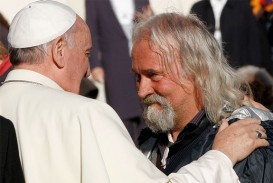
FROM THE TIME he stepped out on the balcony right after his election as pope, Francis has fascinated me. The Holy Father has captured the minds and hearts of many thousands. I wait with joyful expectation for the next statement of his that might be reported in the press. So far I have not been disappointed.
Lately, I have been thinking about the Holy Father’s frequent references to the poor. Those statements should penetrate deeply into the consciousness and consciences of Catholics and others.
Reflecting on some of Pope Francis’ comments about the poor, I have become more aware of two types of poverty; though distinct, they are related. One I call material poverty and the other I call metaphysical, or spiritual poverty. At least one third of the human race is suffering material poverty: they don’t have enough to eat. The entire human race is metaphysically, or spiritually poor.
To be finite is to experience what I am calling metaphysical, or spiritual poverty, and by that I mean we are needy in our being no matter what material possessions we have. Billionaires are as weak in their being as those who are suffering material poverty. If the billionaires don’t know that then they are missing one of the most important truths about themselves. The self-made person does not exist. To be a person is to need other persons.
I guess it is a paradox that what I am calling metaphysical poverty might also be called, when considered from a different angle, metaphysical richness. What I mean is that every person is made for a relationship with God. We are radically needy in our being because we are made for God. Nothing less than the Divine will fulfill us.
Our poverty also reveals our richness: We are the only beings in our experience who are programmed for a love relationship with God, the only ones whose consciousness is pointed toward God and whose will is directed toward God. This is precisely what accounts for the extraordinary dignity of human beings: in our very existence we are magnetized by God. No finite reality will fulfill us. We have a desire for the Infinite. Nothing less will satisfy us.
I suspect that one reason that Pope Francis encourages us to be directly involved with those who are materially impoverished is that he realizes that the material poverty of some people can call our attention to our own metaphysical poverty. Another way of saying this is that material poverty can help us be more aware of our spiritual poverty. Our deepest need is for a redeemer, a savior and Jesus fulfills that need.
One reason that in the Scriptures Jesus speaks so often and in such laudatory terms about the poor is that those who are materially poor know that they are needy. The danger of riches is that we think we are self-sufficient. We settle for finite goods in some form or another instead of focusing our lives on relationship with God, and concern and love for God’s creatures, both human and non-human.
In an excellent essay in Commonweal, April 10, 2015, Cardinal Walter Kasper notes that in Pope Francis’ understanding of the Church, part of the Church’s mission is to spread God’s mercy to people whose spiritual poverty makes them profoundly in need of God’s mercy. Cardinal Kasper writes the following:
“Behind the pope’s pastoral style, which is close to the people, stands an entire theology, indeed a mysticism of the people. …
“Ultimately, the church is rooted in the secret of the most holy Trinity. Salvation is a work of God’s mercy. Out of sheer grace God draws us to himself through his Spirit and brings us together as his people. Thus, the church stands under the primacy of grace; the Lord always precedes us with his love and his initiative. Through his Spirit he draws us to himself, not as isolated individuals, but as his people. So the church must be the place of renegotiated mercy, where all can feel themselves welcomed and loved, where they experience pardon and can feel encouraged to live according to the good life of the Gospel.” (p. 12)
The concept of a “mysticism of the people” fascinates me. I am hoping that Pope Francis talks more about it in the future.
I think it means that in God’s plan we are tied together by the presence of the Holy Spirit, and through the Spirit’s presence our spiritual poverty is enriched by God’s love. Through the Spirit’s presence we become a sign of God’s love and mercy.
Father Robert Lauder, philosophy professor at St. John’s University, Jamaica, is the author of the recently published “Pope Francis’ Spirituality and Our Story” (Resurrection Press).
